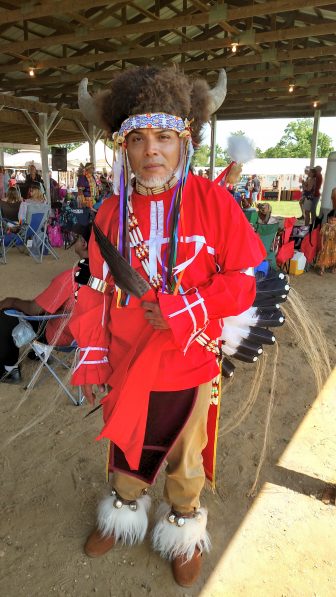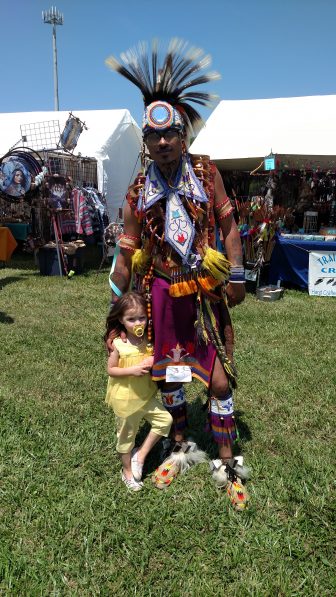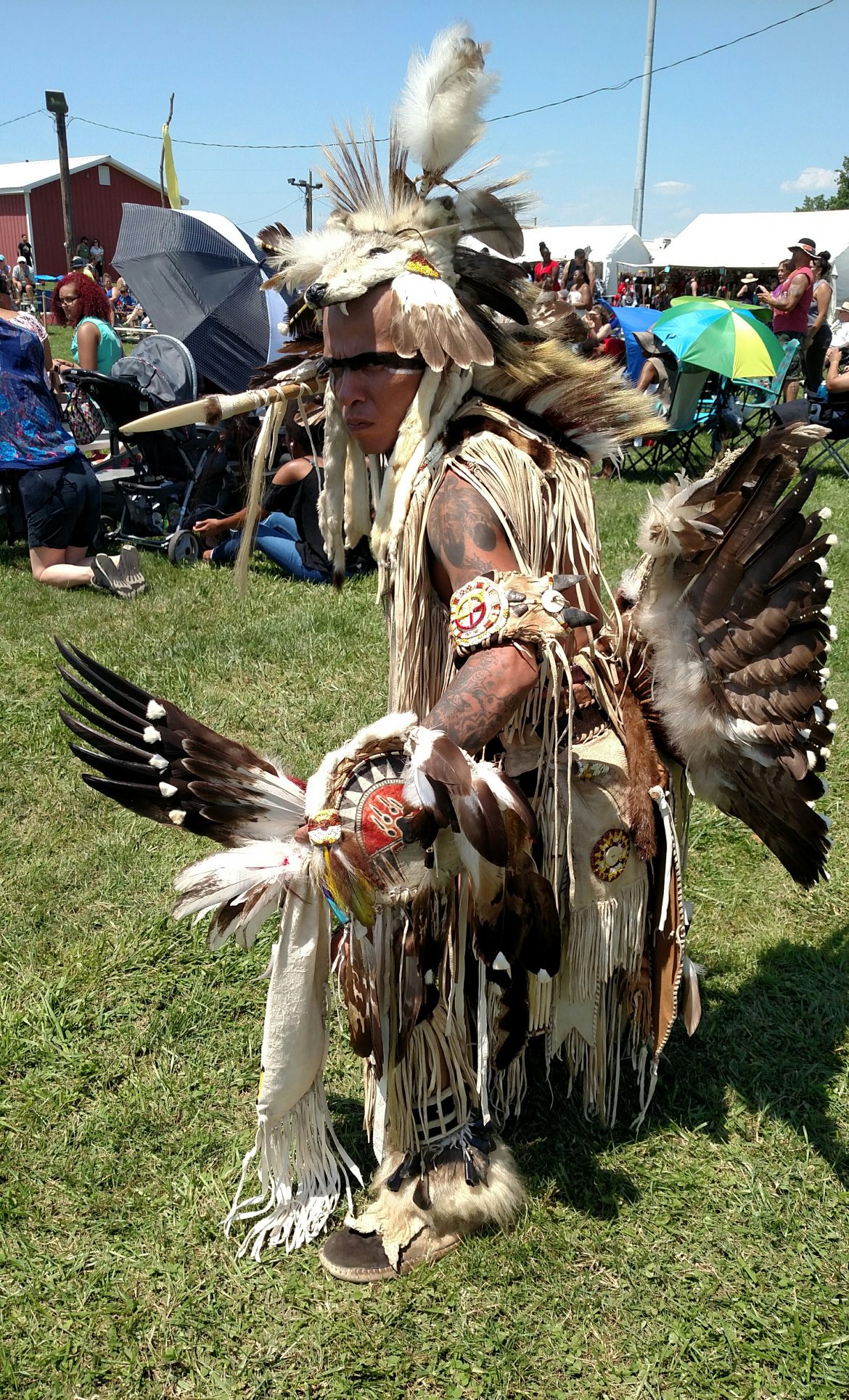American Indian dancers in elaborate regalia moved to the low beat of drums a few weeks ago, as approximately 8,000 spectators and 8,500 participants gathered at the Salem County Fairgrounds to join in the Nanticoke Lenni-Lenape Tribal Nation’s 38th annual powwow. The Nanticoke, a tribe native to New Jersey, hosts the gathering to strengthen ties across tribes, reunite tribe members with families and share their culture with non-native Americans. It’s the only annual gathering the tribe holds that’s open to the public, and attendees come from all over. A family of Aztec American Indians visited from Mexico City, Mexico, to participate in the dances.
“Powwow is not only a chance to gather the native community,” said Lia Gould, organizer of the event and daughter of Nanticoke Chief Mark Gould, “It’s an opportunity to educate the masses. People think we left with the Trail of Tears, but we stuck around.”
The 2017 powwow is Gould’s third or fourth as organizer. She can’t remember. Walking briskly across the fairgrounds, she discussed the dances taking place in a roped-off area at the center of the event, referred to as the arena or circle. “A lot of what I do is the organization of finances. This is a competitive dance powwow. Winners will receive prize money.”
Reverend Doctor John Norwood, a tribal council member at-large and principle justice of the Nanticoke Tribe’s supreme court, discussed the dances in greater detail in an email following the event.

Shunkaka Luta
“Powwow strengthens the bonds between tribes as relationships are reaffirmed in the circle and around the drums,” Norwood wrote. “The powwow features dances that are commonly shared among various tribes and used for competition between dancers in the different ‘powwow dance styles.’ More regional and tribal dances are done at private tribal events…I believe that it is a valuable outreach in cultural education, although not focused on that or providing a deep understanding. Powwow is a ‘teaser’ to build greater interest and understanding in our tribe.”
One dancer, Lenny Harmon, posed for a photograph with his daughter Kiki. Harmon wears glasses and has a Japanese lucky cat tattoo on his left forearm. Safety pins held a slip of paper, marked with his competition number, to his “regalia,” the term used when referring to the dancers’ traditional garb. “I dance men’s chicken,” he said, “but they don’t have that category here, so I’m in the grass category.”
Shunkaka Luta traveled from the Pine Ridge Reservation in South Dakota to attend this powwow. “I’m just here to relax,” he said, standing beneath one of the many open-air barns dotting the property. But his cousin, Cody Coe of Sisseton, South Dakota, is competing in the men’s traditional category. “I do this for a living. It takes me about a week to put this together,” he said, gesturing to his regalia beneath the cloudless sky on Saturday.
Chief Gould sat in the dim light of a barn set at a distance from the hubbub of the arena. The smooth concrete flooring radiated cool, providing reprieve from the heat. He sipped cold sassafras tea from a plastic cup and discussed the state of the tribe, his life and the importance of visibility in New Jersey.
“To me, it’s like turning the page. Who’s going to pick up the stick?” he asked, referring to the passing of many tribal elders. Gould himself lost his mother in October, and his brother a few months ago. “But I think we’re going to be safe.”

Lenny Harmon, at the recent Lenape powwow
The Nanticoke powwow has moved locations over the years. It first took place behind the chief’s home, on a pony track called Cool Run. It then moved to the Cumberland County fairgrounds, “but that just got too expensive,” the chief said. “Then we moved to the Salem County Fairgrounds, after negotiating a price that was economically sound for us, and we’ve been here ever since.”
When asked about the powwow’s function as an educational event, the eldest Gould turned to his childhood. “In the 9th grade, the history teacher asked if there were any Indian people in the class,” the eldest Gould said. “I stood up, and she told me to sit right back down, ‘you’re not Indian.’ That denial right there, in my brain, is enough to say, ‘something needs to be done.’”
That denial, says Chief Gould, stems from a fear held by some in New Jersey who believe, if acknowledged, New Jersey’s Native Americans would demand reparations and possibly the right to open tribal casinos, a business line embraced by tribes in other states. According to Gould, a narrative developed: “There are no Indians in New Jersey.”
Gould sees it as his duty to educate both non-natives and other Nanticoke Indians.
“When I was little, my dad was in the army. He was a POW. While he was gone, I had to live with my grandma,” he said.
“You can tell by looking at me that I was pretty ornery, and my grandma would make me sit on a set of steps for punishment. While I was there, Aunt Mabel and Aunt Mary came to visit, and they sat down – not knowing that I was there – and began talking about the old times and the things that happened to them. Some of it, I couldn’t believe they were laughing about.”
“The thing is, they weren’t allowed to tell us about our history,” the chief continued. “So, every time I saw Aunt Mabel and Aunt Mary coming, I’d go and hide out on the steps, so that I could just sit down and listen. So, I kind of knew my history. But think of all those that didn’t, and when it comes down to the schoolteachers, the schoolteachers either couldn’t or wouldn’t acknowledge the fact that we were still here.”
Still seated in the barn, Chief Gould made a final remark, his voice carrying over the crowd’s distant hum.
“I have a phrase painted on the wall leading to my bedroom,” he said, “It’s been there so long I don’t have to look at it to remember the words, but I still stop and read it. It says, ‘Yesterday I went out to find my enemies, and I could find no friends. Today I went out to find my friends, and I could find no enemies.’”
